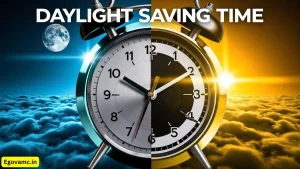Daylight Saving Time (DST) is something most people in New Castle, Pennsylvania, and across the United States will experience twice a year. While the concept is familiar to many, the exact dates and impacts on daily life can often be confusing. With 2025 just around the corner, it’s time to prepare for the next time change. In this article, we’ll provide important details about Daylight Saving Time in New Castle for 2025, including when the clocks change, how it affects your routine, and how to adjust to the shift smoothly.
What Is Daylight Saving Time?
Daylight Saving Time is the practice of adjusting clocks forward by one hour in the spring and then setting them back in the fall. The goal is to make better use of natural daylight by shifting it from the morning to the evening. As a result, people can enjoy more daylight in the evening hours, which has several benefits, including saving energy and providing more time for outdoor activities.
In simple terms, when DST starts, the clock “springs forward,” meaning we lose one hour of sleep. When DST ends, the clock “falls back,” and we gain one hour of sleep. However, this adjustment can cause disruptions to your schedule, making it important to know exactly when the time changes and how to manage it.
When Does Daylight Saving Time Start in 2025?
In 2025, Daylight Saving Time will begin on Sunday, March 9, 2025. On this day, at 2:00 AM, clocks will move forward by one hour. This means that at 2:00 AM, the time will automatically change to 3:00 AM. The shift will give residents of New Castle an extra hour of daylight in the evening, which can be used for everything from outdoor activities to late-night shopping or entertainment.
It’s important to note that this shift is not just for New Castle. All of the United States, except for some regions like Hawaii and parts of Arizona, follows this practice. While the time change may feel a little inconvenient at first, the benefits are clear: more daylight for evening activities.
When Does Daylight Saving Time End in 2025?
Daylight Saving Time will come to an end in 2025 on Sunday, November 2, 2025. On this date, at 2:00 AM, clocks will be set back by one hour, moving from 2:00 AM to 1:00 AM. This means that people in New Castle will enjoy an extra hour of sleep, but it also means shorter days and earlier sunsets as the weather gets colder.
After the time change in November, New Castle will return to standard time for the remainder of the fall and winter months. This shift helps people adjust to the shorter daylight hours during the colder months.
How Does Daylight Saving Time Affect Daily Life in New Castle?
Daylight Saving Time affects many aspects of daily life, from how people sleep to how they plan their activities. Here are a few key ways DST can impact New Castle residents:
- Sleep Disruptions: One of the most immediate effects of Daylight Saving Time is the disruption of sleep. In the spring, people lose an hour of sleep, which can lead to grogginess and tiredness. The transition in the fall, on the other hand, may cause people to feel like they have gained extra rest, but they will have to adjust to earlier darkness.
- Health and Well-Being: Changes to sleep schedules can affect physical and mental health. Sleep deprivation due to the spring time change has been linked to an increase in stress, anxiety, and even heart problems. The disruption to sleep patterns may also make people more prone to accidents. It’s important to prioritize good sleep hygiene during the time change to minimize these risks.
- Increased Energy Consumption: Although DST is designed to save energy by reducing the need for artificial lighting, studies show that the energy savings are minimal. In fact, some studies suggest that the energy savings might be offset by increased use of heating or cooling in certain areas, making the actual benefits unclear.
- Work and School Schedules: People in New Castle may need to adjust their work and school routines to accommodate the time shift. Teachers, students, and employees may need to adjust their bedtimes and morning routines, especially in the days following the time change. The shift can affect productivity, with some people experiencing difficulty concentrating or feeling tired during the initial adjustment period.
- Transportation and Travel: If you have travel plans around the time change, make sure to adjust your schedule accordingly. Flights and transportation schedules can be impacted, as will the coordination with friends or family who may live in different time zones. Being aware of the time change can help avoid confusion when making plans.
Tips for Adjusting to Daylight Saving Time in New Castle
While the time change can feel disruptive, there are several ways to adjust smoothly and minimize the negative effects. Here are some practical tips for New Castle residents:
- Gradually Adjust Your Sleep Schedule: In the week leading up to the time change, try going to bed and waking up 15 minutes earlier each day. This gradual adjustment will help your body get used to the shift and reduce the shock to your system.
- Get Plenty of Sunlight: After the clocks spring forward in March, try to spend time outside during the day. Natural sunlight will help regulate your internal clock, making it easier to adjust to the new schedule. This is especially important for people who struggle with the time change and may experience symptoms of Seasonal Affective Disorder (SAD).
- Stay Hydrated and Eat Healthy: Staying hydrated and maintaining a healthy diet can improve your energy levels and make the adjustment smoother. Avoid too much caffeine or heavy meals close to bedtime, as they can disrupt sleep.
- Be Mindful of Your Mental Health: The time change can cause feelings of fatigue and mood changes. If you notice that you feel stressed or overwhelmed, take steps to relax and give yourself a break. Take walks, meditate, or engage in activities that help you unwind.
Why Some People Want to End Daylight Saving Time
While Daylight Saving Time has been in place for many years, there is a growing movement to end the practice. Critics argue that the disruption to sleep schedules and the negative health effects outweigh the benefits of extended daylight. In fact, several states, including Florida and California, have explored the idea of making DST permanent or ending the time change altogether.
Proponents of ending DST claim that it would reduce confusion, improve sleep quality, and provide better consistency year-round. Others argue that the practice is outdated and no longer provides the same benefits as it did in the past.
Conclusion
Daylight Saving Time in New Castle for 2025 will begin on Sunday, March 9, with clocks moving forward one hour, and end on Sunday, November 2, when clocks will be set back one hour. This change will have an impact on people’s routines, sleep, and health, so it’s important to plan ahead. By following a few simple tips to adjust to the time change, residents can make the transition as smooth as possible. Whether you love the extended daylight hours or prefer the extra sleep in the fall, being prepared for the time change will help you manage the shift effectively.
Disclaimer – Our editorial team has thoroughly fact-checked this article to ensure its accuracy and eliminate any potential misinformation. We are dedicated to upholding the highest standards of integrity in our content.

























+ There are no comments
Add yours